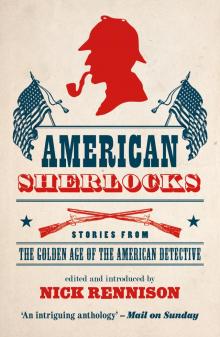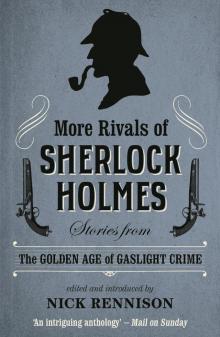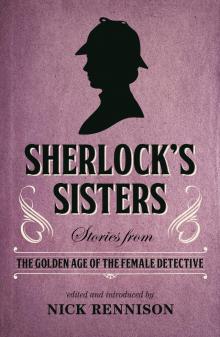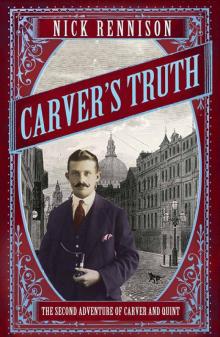- Home
- Nick Rennison
Carver's Truth
Carver's Truth Read online
CARVER’S TRUTH
NICK RENNISON
DEDICATION
To my family in Berlin –
Wolfgang, Lorna and Milena
PART ONE
LONDON
CHAPTER ONE
The street was not smart but the vehicle which turned into it was. Costermongers’ carts were far more familiar here than broughams, and passers-by stared with unaffected interest at the brightly painted carriage, seemingly fresh from a Long Acre workshop, which came to a halt outside one of the terraced houses.
A young woman, dressed in blue, emerged from the basement area of the house and stepped into the street. She was wearing a veil, also blue, which hid her face from the group of idlers that had swiftly gathered to admire the brougham. Its driver sat impassively on his box seat at the front as the door to the carriage was opened from within. The woman in blue moved towards it, the small crowd parting to let her through. A gentleman in a grey morning suit alighted from the carriage and politely handed her into it, following her into the carriage’s dark interior after she was safely settled into her seat. The door closed, the driver flicked his whip above the horse’s head and the brougham moved off, making its way towards the parts of town where its appearance would cause much less of a stir.
The loiterers on the pavement watched it go and, as it rounded the corner of the street and disappeared, began to speculate idly on the reasons for its visit to their dull corner of north London.
* * * * *
Adam Carver, sometime traveller, intelligencer and occasional photographer, was surprised to see the man from the Foreign Office at the burial of Mr Moorhouse, his long-standing and fond acquaintance from the Marco Polo Club. He could think of no reason why the Honourable Richard Sunman should be there, standing in a remote corner of Kensal Green Cemetery, as the old man’s body was committed to the ground.
It was a cold but bright spring morning and Adam knew why the other people gathered around the newly dug grave were present. The large, middle-aged lady to his right, weeping noisily behind her black veil, was Mr Moorhouse’s niece and sole surviving relative. During their conversations at the Marco Polo, the old man had occasionally spoken of her. Although Mr Moorhouse had been far too much of a gentleman to say anything directly, Adam had gained the impression that his friend had thought little of this niece. ‘Flora,’ he had once said as they were both sitting in the club’s sitting room, ‘is a woman who observes all the social proprieties.’ His tone of voice had suggested that he might have warmed to her more if she had not. Today, Adam thought, her loudly expressed grief sounded much more the result of respect for funereal convention than genuine loss. He doubted if she had seen her uncle more than a handful of times in the last years of his life.
The thin and sour-faced woman on Flora’s right was her companion. Her hand was clutching the niece’s arm as if she was arresting her and taking her into custody. Adam had been mildly surprised to see the two of them. Women did not always, or even usually, attend funerals. Moorhouse’s niece had not entirely observed the social proprieties on this occasion. He guessed that the lives of Flora and her companion were so starved of drama that they could not bring themselves to miss the ceremony, even if the strictest etiquette demanded that they should stay away.
Grouped in a semi-circle to Adam’s left were Moorhouse’s other friends from the Marco Polo. Baxendale, the club’s secretary, was shifting uncomfortably from foot to foot and looking as if he would rather be anywhere else in the world than Kensal Green. Duncan Farfrae – a man whose chief claim to fame in the club was that, as a small boy in Edinburgh, he had once sat on the explorer Mungo Park’s knee – was gazing mournfully into the middle distance. With Moorhouse’s death, he had become the Marco Polo’s oldest member and he looked as if intimations of his own mortality were preying on his mind. There were, perhaps, a dozen other men Adam recognized from his regular visits to the club in Pall Mall. He was surprised that there were not more. Mr Moorhouse, he had always assumed, had been a popular member of the Marco Polo. He had certainly been an almost permanent fixture in its smoking room since before many of the other members had been born. Everyone had known him but it seemed that only a handful of people had been prepared to make the journey to the West London cemetery to mourn his passing.
Sunman had not joined the group around the grave. He was standing some fifty yards away on one of the paths that criss-crossed the cemetery. Whenever Adam glanced in his direction, he appeared to be inspecting an elaborate monument on which two stone angels were playing harps and gazing heavenwards.
It was only when the ceremony was over and Adam, his commiserations offered to the still-weeping niece, was making his way back to the main entrance of the cemetery that Sunman approached. He was immaculately dressed in a black frock coat and looked as calm and collected as he always did. It was as if the two of them had met while strolling along Piccadilly rather than in a burial ground in the further reaches of the London suburbs. ‘Poor old Moorhouse,’ he said, reaching out to take Adam’s hand in greeting. ‘He was quite a friend of yours, I understand.’
‘We met frequently at the Marco Polo. A gentleman of the old school.’
‘He was, indeed.’
‘I had no notion you knew him.’
Sunman waved his hand in the air as if to suggest that there were few people in London he did not know.
The two men began to walk in the direction of the Harrow Road, and Adam found himself wondering just why his companion had engineered this meeting. He had known Richard Sunman since his schooldays but never very well. Early in his Foreign Office career, the young aristocrat had informally recruited Adam, then about to travel to European Turkey, as an off-the-record agent to report on his journeys through this especially sensitive part of the Ottoman Empire. The previous year, on his second and more eventful expedition to that part of the world, Adam had again supplied Sunman with his thoughts and impressions on what he saw. His friend had seemed to set rather more store on them than had Adam himself. However, since Adam’s return from a journey that had ended in betrayal, murder and the extraordinary death of his former Cambridge tutor, Professor Burton Fields, there had been little communication between the two men. Now Sunman, a creature of Whitehall and the West End, had turned up unexpectedly in an out-of-town cemetery. Adam was intrigued, but the man from the Foreign Office gave no indication that he was ready to explain what he was doing in Kensal Green Cemetery. The two of them walked on.
‘Well, would you credit it?’ Sunman came to a sudden halt. ‘I knew this chap. I had no idea he’d joined the great majority.’ He moved to the left of the path and pointed his malacca cane towards a red granite memorial, which looked to have only recently been erected. ‘Well, Pater knew him. I met him. That’s probably a more accurate way of putting it.’
Adam leaned forward to read the inscription: ‘Sacred to the memory of Mr James Henry Dark who died 17th October 1870, aged 76. For many years Proprietor of Lord’s Cricket Ground.’
‘Pater was doing something for MCC,’ his companion continued. ‘Sitting on some committee or other back in the early sixties. This fellow wanted them to buy the lease of the ground from him.’
Adam, who had never heard of James Henry Dark and certainly never met him, could think of nothing to say. His thoughts had returned to Mr Moorhouse, whom he had known and much liked. His companion continued to gaze at the memorial.
‘The paths of glory lead but to the grave, eh, Carver?’ he remarked. He did not sound unduly troubled by the prospect. Perhaps he thought that, in deference to his social standing, he would be excused from treading them.
Adam nodded his head in brief agreement. He was certain that his friend from the Foreign Office had not travelled all the way to Kensal Green simply to indulge in commonplace observations about the inevitability of death. But the languid young aristocrat showed no signs of being in a hurry to divulge his other motives, whatever they might be. Instead, he turned away from the last resting place of Mr Dark and continued to amble along the path.
Adam followed him. The only sounds were the crunching of gravel beneath their feet and birdsong overhead. When a minute had passed and Sunman had shown no sign of disturbing the silence of the burial ground, Adam felt constrained to speak. ‘I am surprised to see you here, Sunman. I would have thought you rarely strayed this far west of town.’
‘I wished, of course, to pay my last respects to Moorhouse,’ Sunman said. ‘He was at school with pater, you know. Sixty years ago.’ He shook his head as if he could scarcely credit the idea of his own father once being a schoolboy. ‘Pater would have been here himself. But the gout . . .’ He shook his head again, leaving it to Adam’s imagination to conjure up thoughts of just how crippling that affliction might be. ‘I did, however, have another reason for travelling out here. What you might call my ulterior motive.’
The two men had now emerged from the main cemetery gate. A black and yellow landau, looking impossibly elegant and out of place, was standing just outside. The coachman, when he saw his master approaching, leapt from his driving seat and hastened to open the door to the carriage. Sunman gestured towards its interior. ‘Let me take you back to town, old man.’
Adam had intended to walk the five miles back to Doughty Street accompanied only by his memories of Mr Moorhouse, but he could see no polite means of refusing Sunman’s offer. He climbed into the landau. His friend gestured in silent command to the coachman and followed him. They settled into the plush upholstery of the carriage’s interior as it began to move in the direction of the distant city.
‘I wished to speak to you in private, Carver.’ As Sunman spoke, he was brushing near-invisible specks of dust from the sleeves of his frock coat. ‘And I knew that you would be attending the interment of our poor friend Moorhouse. The occasion seemed opportune. I thought we could talk on the way back to town.’
‘I am happy to do so. I do not think we have seen one another this year.’ In truth, Adam thought, he and Sunman had not spoken since a brief meeting in St James’s Park shortly after his return from Athens in the autumn of 1870.
‘This is rather more than a social rencontre, old man. Delightful though it is to see you.’ Sunman smiled briefly and perfunctorily, before reaching into one of the inner pockets of his coat and pulling out a photograph. He handed it to Adam. It was a cabinet card showing a pretty blonde woman. She was sitting in a photographer’s studio, holding an unfurled parasol above her head. ‘Her name is Dolly Delaney.’
Adam was puzzled. Why would Sunman be interested in someone named Dolly Delaney? He turned over the photograph. There was nothing on the back of the image.
‘She is an actress.’ Sunman spoke as if he was referring to some exotic species of creature such as a platypus or a manatee that he had heard described but never himself encountered. Perhaps, Adam thought, he hadn’t. ‘And a dancer.’
‘An enticing young lady. Doubtless she graces any stage on which she appears. But why are you showing me her carte de visite?’
‘We wish to speak to her.’
‘We?’
‘Certain people in King Charles Street.’
‘In the Foreign Office?’
Sunman nodded.
Adam remained bemused by the turn the conversation had taken. What possible connection could there be between the upper echelons of government and some pretty ingénue on the London stage?
‘Can you not find her at the theatre where she works?’ he asked, after a brief pause.
‘She has disappeared. She has not been seen at her lodgings or at the Prince Albert theatre for nearly a week.’
‘Why should you and your colleagues be interested in the girl?’ Adam looked at his friend in puzzlement. He waved the photograph that was still in his hand.
‘I regret I cannot tell you why. I can only say it is imperative that she be found.’
There was silence in the carriage. Adam looked again at the young woman on the cabinet card. She was overly made up but she had a pleasant, attractive face. She seemed like a girl with whom it would be fun to while away an evening at Gatti’s or a music hall . . . Adam realized suddenly what linked her with the Foreign Office. Some gentleman there had been doing exactly that. Could it possibly have been Sunman himself? He glanced at his companion, who was staring thoughtfully out of the landau’s window, as if memorizing the route they were taking. Adam decided that he was an unlikely candidate for the role. If Sunman had his affaires de coeur, which he probably did, he would be far too discreet to allow them to impinge on his work for the government.
‘Why are you telling me anything at all about her?’ Adam asked eventually.
‘I have suggested to my colleagues that you might be able to help us in locating her.’
‘I? But surely the police would be able to trace a missing person?’
‘It is better if the police are not involved in the affair. The fewer people who know that Miss Delaney is of importance, the happier we shall be.’
‘But is she of importance? How is she of importance?’
‘In herself, of course, she is not. However, we believe that she is in possession of information that gives her a significance she would not otherwise have.’
‘And what information is it that you believe she possesses?’
‘Alas, that I cannot divulge to you, Adam.’ Sunman smiled politely, almost apologetically.
Adam noticed that Sunman had begun to use his Christian name. Although they had known one another since their school days, he had rarely felt entirely comfortable with the young aristocrat, previously detecting various degrees of condescension in the other man’s conversations with him. He saw now that Sunman, by his standards, was eager to ingratiate himself. ‘One of your colleagues has been squiring Dolly around town, hasn’t he?’
Sunman inclined his head in the faintest of agreements. These were not the kind of words he would use himself, he managed to convey, but they were essentially true.
‘He has been indiscreet in his entertainment of her, has he not?’ Adam almost laughed as he said this. He was rather enjoying the situation. Another thought struck him. ‘The girl is not enceinte, is she?’
‘That would be an added complication, but it is not one that we believe we need to include in our calculations.’
Adam made to hand Dolly’s photograph back to his companion, but Sunman shook his head. ‘Keep it,’ he said. ‘You will need it to help you in your search for the girl.’
Adam took one last look at the carte de visite. She really was a most attractive young woman. He took his wallet from his jacket pocket and slipped the photograph into it. ‘Why have you chosen to ask me to find her?’ he asked. ‘Not that I am not flattered that you thought of me.’
‘We need someone we can trust. We need someone with connections in the – ah – bohemian world in which Miss Delaney lives.’
‘Again I am flattered. Although I am not certain that my life is particularly bohemian.’
‘You have written books,’ Sunman said, as if this was almost sufficient proof in itself. ‘You live in Bloomsbury. You are close friends with that chap, Jardine – who is working as a scene painter in the very theatre where the young woman was last employed.’
‘Perhaps you should ask Cosmo to look for her.’
‘We do not trust him. Whereas, in that unfortunate business in Turkish Greece, you proved yourself entirely reliable.’
Had he, Adam wondered
, proved himself entirely reliable? He smiled inwardly at Sunman’s euphemism. The murderous madness of Professor Fields had certainly been ‘unfortunate’ at the very least. He debated whether or not he should accept this dubious commission. Did he truly relish the prospect of tracking down the whereabouts of some missing actress, however pretty she might be? He was not about to set up business as a private enquiry agent. And yet the months since his return from Greece had not been busy ones. Too often fruitless thoughts of Emily Maitland, the girl he had loved and lost the previous year, had troubled him. Perhaps this was the distraction he needed to take his mind away from her.
‘I will do what you wish, Sunman,’ he said. ‘I will look for this elusive young lady.’
‘Capital,’ his friend replied, as if he had never doubted for a moment that Adam would.
‘I assume that,’ Adam continued, ‘however much you may mistrust him, I am free to approach Cosmo with questions about the young lady.’
‘I would suggest that it would be easiest to speak to him before you speak to anyone else.’ Sunman nodded his agreement. ‘Although the theatre is a large one and employs many people. There is the possibility that he did not meet the girl or take notice of her.’
Adam thought about the blonde girl in the photograph. ‘Oh, I believe Cosmo would have taken notice of her,’ he said.
CHAPTER TWO
Adam gazed up at the vaulted roof of the German Gymnasium, its vast timber beams arching overhead. Today, the gymnasium was not as busy as it usually was but there were still more than a score of men in the main hall, engaged in a variety of activities. To Adam’s left, one was swinging himself back and forth on the parallel bars; to his right stood several pommel horses, over which young men dressed in loose-fitting white shirts and trousers were leaping. In the centre of the hall, three pairs of boxers exchanged blows. A railed walkway ran all around the main hall and half a dozen spectators were leaning on the wooden rails, looking down on the athletic activities below.

 American Sherlocks
American Sherlocks More Rivals of Sherlock Holmes
More Rivals of Sherlock Holmes Sherlock's Sisters
Sherlock's Sisters Carver's Truth
Carver's Truth